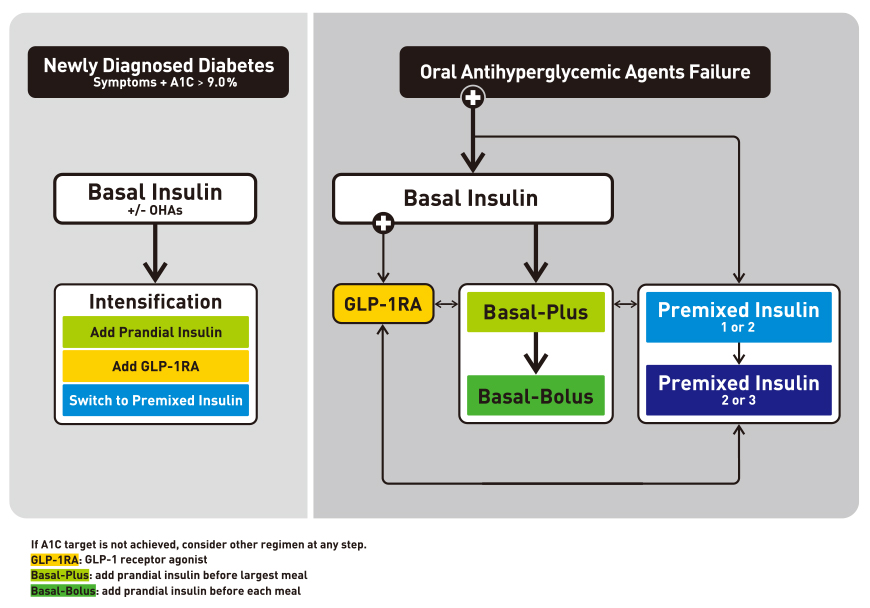J Korean Diabetes.
2018 Mar;19(1):31-34. 10.4093/jkd.2018.19.1.31.
Summary of Insulin Therapy for Adult Patients with Type 2 Diabetes Mellitus: A Position Statement of the Korean Diabetes Association, 2017
- Affiliations
-
- 1Department of Internal Medicine, Yonsei University College of Medicine, Seoul, Korea. bwanlee@yuhs.ac
- KMID: 2408655
- DOI: http://doi.org/10.4093/jkd.2018.19.1.31
Abstract
- Since 1990, the Korean Diabetes Association has published Clinical Practice Recommendations, which include the "Standards of Medical Care in Diabetes." The position statement of the Korean Diabetes Association on diabetes care and management has been recognized as one of the primary references for medical care in diabetes. This English version published in 2017 will be a good reference for daily clinical practice of diabetes care. In this paper, I provide an executive summary of insulin therapy for adult patients with type 2 diabetes in Korea.
Keyword
MeSH Terms
Figure
Reference
-
1. Lee BW, Kim JH, Ko SH, Hur KY, Kim NH, Rhee SY, Kim HJ, Moon MK, Park SO, Choi KM;. Insulin therapy for adult patients with type 2 diabetes mellitus: a position statement of the Korean Diabetes Association, 2017. Diabetes Metab J. 2017; 41:367–373.
Article2. Horvath K, Jeitler K, Berghold A, Ebrahim SH, Gratzer TW, Plank J, Kaiser T, Pieber TR, Siebenhofer A. Longacting insulin analogues versus NPH insulin (human isophane insulin) for type 2 diabetes mellitus. Cochrane Database Syst Rev. 2007; (2):CD005613.
Article3. Giugliano D, Maiorino MI, Bellastella G, Chiodini P, Ceriello A, Esposito K. Efficacy of insulin analogs in achieving the hemoglobin A1c target of <7% in type 2 diabetes: meta-analysis of randomized controlled trials. Diabetes Care. 2011; 34:510–517.
Article4. Russell-Jones D, Gall MA, Niemeyer M, Diamant M, Del Prato S. Insulin degludec results in lower rates of nocturnal hypoglycaemia and fasting plasma glucose vs. insulin glargine: a meta-analysis of seven clinical trials. Nutr Metab Cardiovasc Dis. 2015; 25:898–905.
Article5. Ritzel R, Roussel R, Bolli GB, Vinet L, Brulle-Wohlhueter C, Glezer S, Yki-Järvinen H. Patient-level meta-analysis of the EDITION 1, 2 and 3 studies: glycaemic control and hypoglycaemia with new insulin glargine 300 U/ml versus glargine 100 U/ml in people with type 2 diabetes. Diabetes Obes Metab. 2015; 17:859–867.
Article6. Aschner P, Sethi B, Gomez-Peralta F, Landgraf W, Loizeau V, Dain MP, Pilorget V, Comlekci A. Insulin glargine compared with premixed insulin for management of insulin-naïve type 2 diabetes patients uncontrolled on oral antidiabetic drugs: the open-label, randomized GALAPAGOS study. J Diabetes Complications. 2015; 29:838–845.
Article7. Lee YH, Lee BW, Chun SW, Cha BS, Lee HC. Predictive characteristics of patients achieving glycaemic control with insulin after sulfonylurea failure. Int J Clin Pract. 2011; 65:1076–1084.
Article8. Min SH, Yoon JH, Hahn S, Cho YM. Comparison between SGLT2 inhibitors and DPP4 inhibitors added to insulin therapy in type 2 diabetes: a systematic review with indirect comparison meta-analysis. Diabetes Metab Res Rev. 2017; 33.
Article9. Dieuzeide G, Chuang LM, Almaghamsi A, Zilov A, Chen JW, Lavalle-González FJ. Safety and effectiveness of biphasic insulin aspart 30 in people with type 2 diabetes switching from basal-bolus insulin regimens in the A1chieve study. Prim Care Diabetes. 2014; 8:111–117.
Article10. Mathieu C, Storms F, Tits J, Veneman TF, Colin IM. Switching from premixed insulin to basal-bolus insulin glargine plus rapid-acting insulin: the ATLANTIC study. Acta Clin Belg. 2013; 68:28–33.
Article
- Full Text Links
- Actions
-
Cited
- CITED
-
- Close
- Share
- Similar articles
-
- Glucagon-Like Peptide-1 Receptor Agonists for the Treatment of Type 2 Diabetes Mellitus: A Position Statement of the Korean Diabetes Association
- Insulin Therapy for Adult Patients with Type 2 Diabetes Mellitus: A Position Statement of the Korean Diabetes Association, 2017
- Genetic Diseases Associated with Diabetes Mellitus
- Insulin therapy for adult patients with type 2 diabetes mellitus: a position statement of the Korean Diabetes Association, 2017
- Using Motivational Interviewing to Overcome Psychological Insulin Resistance


